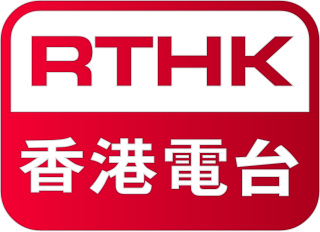Communications in Hong Kong includes a wide-ranging and sophisticated network of radio, television, telephone, Internet, and related online services, reflecting Hong Kong's thriving commerce and international importance.
Hong Kong's media consists of several different types of communications of mass media: television, radio, cinema, newspapers, magazines, websites and other online platforms.

Radio Television Hong Kong (RTHK) is the public broadcasting service of Hong Kong. GOW, the predecessor to RTHK, was established in 1928 as the first broadcasting service in Hong Kong. As a government department under the Commerce and Economic Development Bureau of the Hong Kong Government that directly supported by annual government funding, RTHK's educational, entertainment, and public affairs programmes are broadcast on its eight radio channels and five television channels, as well as commercial television channels.

Asia Television Limited is a digital media and broadcasting company in Hong Kong. Established as the first television service in Hong Kong as Rediffusion Television on 29 May 1957, it shifted to terrestrial television on 30 November 1973 and was renamed Asia Television on 24 September 1982. ATV operated two main over-the-air channels: the Cantonese-language ATV Home and the English-language ATV World.

Pony Canyon Inc., also known by the shorthand form Ponican, is a Japanese company, established on October 1, 1966, which publishes music, DVD and VHS videos, movies, and video games. It is affiliated with the Japanese media group Fujisankei Communications Group. Pony Canyon is a major leader in the music industry in Japan, with its artists regularly at the top of the Japanese charts. Pony Canyon is also responsible for releasing taped concerts from its artists as well as many anime productions and several film productions.
The Australian Communications and Media Authority (ACMA) is an Australian government statutory authority within the Communications portfolio. ACMA was formed on 1 July 2005 with the merger of the Australian Broadcasting Authority and the Australian Communications Authority.
A broadcast license is a type of spectrum license granting the licensee permission to use a portion of the radio frequency spectrum in a given geographical area for broadcasting purposes. The licenses generally include restrictions, which vary from band to band.

The Home and Youth Affairs Bureau is a policy bureau of the Hong Kong Government. The bureau has general responsibility over local administration, with a remit covering youth affairs, family planning, women's affairs, social development, fire safety, and matters related to the district councils. One of the important roles of the Home and Youth Affairs Bureau is to enhance liaison and communication with all sectors of the community including the Legislative Council and the general public. The Bureau was established on 1 July 1997 as the Home Affairs Bureau, succeeding the Home Affairs Branch of the colonial government secretariat. It was reorganized at the beginning of the Lee government in 2022 as the Home and Youth Affairs Bureau, with some of its functions transferred to the new Culture, Sports and Tourism Bureau. It has its headquarters in the West Wing of the Central Government Complex in Tamar.

The Communications Authority is a statutory body responsible for licensing and regulating the broadcasting and telecommunications industries in Hong Kong. It was formed in 2012 through a merger of the Hong Kong Broadcasting Authority, Television and Entertainment Licensing Authority, and the Telecommunications Authority. The organisation is authorized to investigate complaints made regarding programmes, issue warnings and fines, or even suspend the license of the radio or television station.

Television and Entertainment Licensing Authority (TELA) was an entertainment regulatory agency in Hong Kong under the Government of Hong Kong.
The Communications Authority of Kenya (CA) is the independent regulatory agency for the ICT industry in Kenya with responsibilities in telecommunications, e-commerce, broadcasting,cyber security, and postal/courier services. The CA is also responsible for managing the country's numbering and frequency spectrum resources, administering the Universal Service Fund (USF) as well as safeguarding the interests of users of ICT services.

The Commerce and Economic Development Bureau is a policy bureau of the Government of Hong Kong responsible for policy matters on Hong Kong's external commercial relations, inward investment promotion, intellectual property protection, industry and business support, tourism, consumer protection and competition, as well as broadcasting, film-related issues, overall view of creative industries, development of telecommunications, and control of obscene and indecent articles in Hong Kong.

The Constitutional and Mainland Affairs Bureau is a ministerial-level policy bureaux of the Government of Hong Kong responsible for the implementation of the Basic Law, including electoral matters and promotion of equal opportunities and privacy protection. The bureau also functions as the intermediary between the HKSAR Government and the Central People's Government and other Mainland authorities under the principles of "One Country, Two Systems", including the coordination of liaison between the HKSAR Government and Central authorities, promoting regional co-operation initiatives between Hong Kong and the Mainland, and overseeing the operation of offices of the HKSAR Government on the Mainland.

Hong Kong Technology Venture Company Limited is a Hong Kong–based technology company primarily known for its e-commerce platform and once had plans to become a television station. HKTV currently provides an over-the-top shopping and entertainment ("shoppertainment") platform named HKTVMall.
The Hong Kong Broadcasting Authority (HKBA) was an organisation responsible for licensing and regulating the broadcasting industry in Hong Kong. It was formed in 1987. The organisation was authorised to investigate complaints made regarding programmes, issue warnings and fines, or even suspend the license of the radio or television station.
Call signs in Asia are rarely used to identify broadcast stations. In most Asian countries, broadcast stations use other forms of identification. Few countries west of the Pacific Ocean, namely Japan, South Korea, Indonesia, the Philippines and Taiwan are exceptions to this rule. Amateur radio stations in India, Pakistan, Korea and Japan are allocated call-signs.

RTHK Radio 3 is a broadcasting station under Radio Television Hong Kong. It was launched on 30 June 1928 and is the first radio broadcast station in Hong Kong. At present, the station broadcasts on 567 kHz for all of Hong Kong, as well as additional FM frequency in selected regions.

The 2010s in Hong Kong refers to Hong Kong during the period from 2010 until 2019 under the People's Republic of China (PRC), in which this period of this decade were marred by the political instability, as well as the health crisis that occurs in the end of 2019.









